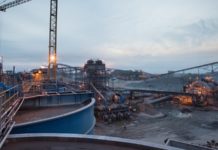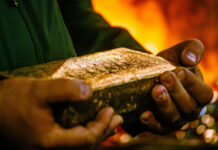
[miningmx.com] — IN less than two years Sallies, which has been unprofitably occupied in fluorspar mining activities, has managed to raise a chunky R170m from investors.
One of those investors was retail tycoon Christo Wiese, who at one point chipped in R30m in a shares-for-cash issue at 70c/share.
If we add the R75m that will be raised by the recently proposed debenture issue to existing shareholders then Sallies has raised nearly R250m.
That’s a big number for a junior mining operation, but it’s even more gasp-worthy when one realises that Sallies currently only holds a market capitalisation of R315m. Those figures tell you just how much value has been eroded at Sallies, and how much cash has been burnt up sans tangible returns.
Still it’s quite surprising that Sallies’ shareholders are willing to pitch in fresh capital again, something which at face value may look like throwing good money after bad.
On February 5, chairman and CEO Tom Dale issued a frank assessment of the situation at Sallies – giving a the kind of brutal account that could scare the pants of less hardy investors.
Dale noted that after R75m was raised in a rights issue in July 2007 it became clear that management “did not know its production costs.’ This meant uneconomical cut off grades were being implemented in the pits.
It was during the rebuilding of the information systems, Dale explained, that the “central problem of the company was exposed. The central problem was that Sallies was selling fluorspar at prices below its unit cost of production. In other words Sallies was subsidising its customers.
That is a stark admission – especially since Sallies had been so keen to shed its “onerous’ Honeywell contract because the arrangement was fixed at an unviable price.
Dale’s statements cast previous management – led by Izak Marais – in rather a poor light. Marais, who is now employed at Aflease Gold, may well have sounded the turnaround horn too soon during his tenure at Sallies.
Some of Marais’ statements to shareholders were classic cases of over-promising and under-delivering.
Dale – a mining industry veteran – has taken a different tack, and perhaps a warts and all assessment at Sallies was long overdue (especially ahead of another fund raising exercise).
Sill Dale contended that the main challenges at Sallies have been identified.
But that does not mean the short term won’t be ugly. Sallies advised shareholders yesterday that the loss for the half-year ending December 2007 would be R25m – which seems high for a six month trading period even after Dale’s frank account of the group’s trials and tribulations.
A R25m interim loss is of the scale when serious doubts might be raised as to whether Sallies will ever shift back into the black.
The clincher in Dale’s statement was the brutal assessment that “Sallies has, as yet, no clear competitive edge.’
Whether management can develop such an edge and establish a track record for mining low grade, variable fluorspar deposits is debatable – something that is reflected in Sallies brittle share price of around 50c on the JSE.
Clearly influential pockets of the Sallies’ shareholder body are still hopeful, especially since the latest fund raising exercise has been fully underwritten. Dale referred to existing shareholders and a prospective new shareholder (who is that we wonder?) once again “stepping resolutely into the breach’.
Dale believed Sallies future profitability would depend on a sustainable turnaround at the Witkop operation and a successful re-engineering at the Buffalo project.
Above all, Sallies must deliver at fluorspar prices which are “significantly higher’ than existing contracts.
Fair enough, but it won’t be easy. Dale admitted that the ore body at Witkop is low grade and highly variable as well as pointing out that Buffalo – as a newcomer to the market – has been selling its output at a discount.
From a macro point of view Dale at least had some more encouraging news. He argued that China (the world’s largest fluorspar producer) had been progressively withdrawing low priced product for export.
Dale said the fluorspar market had consequently tightened, adding that Sallies had already “sold substantial volumes of acid grade fluorspar for export in 2008 at prices significantly higher than those achieved in 2007.’
He said prices achieved in the export contracts agreed to date for 2008 delivery indicated that the market was moving “rapidly’ towards the sharply higher levels required Sallies.
Long suffering shareholders will be hoping so.










